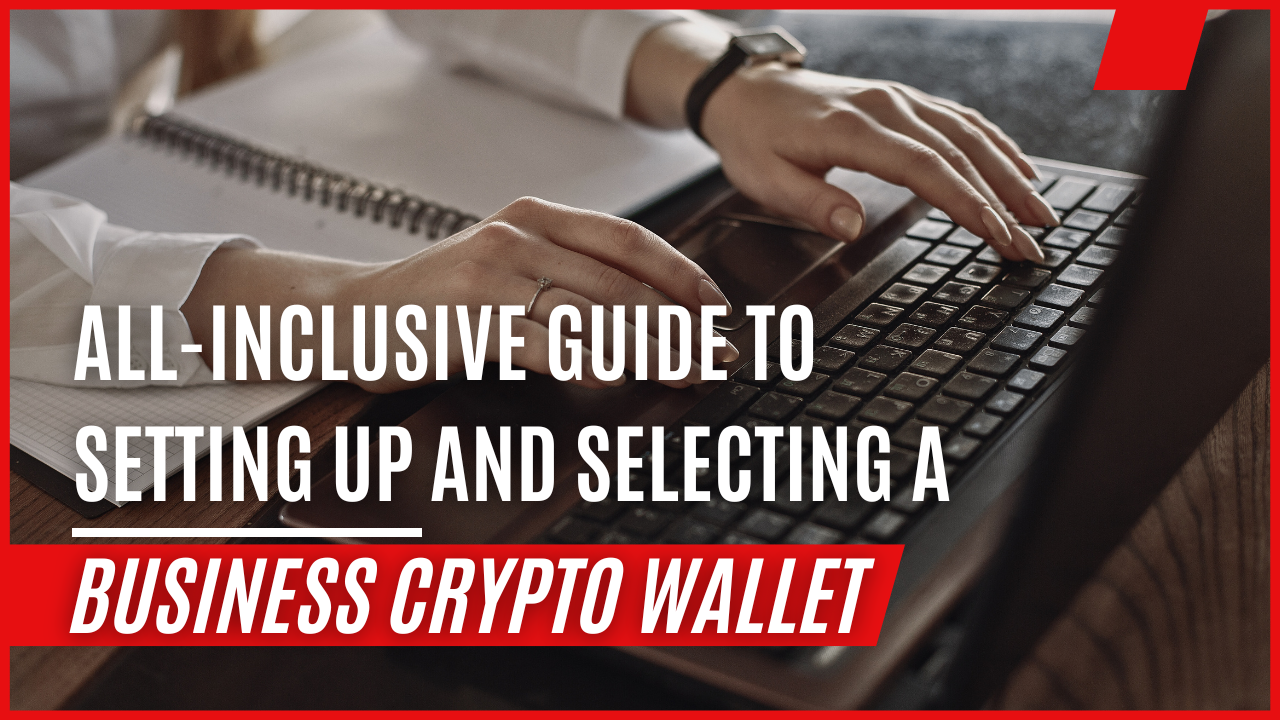All-Inclusive Guide to Setting Up and Selecting a Business Crypto Wallet

Cryptocurrencies have changed the game in the ever-changing world of finance and commerce by providing new opportunities for business expansion and financial transactions. In order for businesses to fully embrace the decentralized revolution, opening a business cryptocurrency wallet has become essential. It can be intimidating to sort through the plethora of options, though. Don’t worry; we’re going to take you on a journey to simplify the process of opening a business cryptocurrency wallet and selecting the best one for your company.
Table of Contents
ToggleAll-Inclusive Guide to Setting Up and Selecting a Business Crypto Wallet
Open the door to the future of business with our in-depth guide on setting up and selecting a business cryptocurrency wallet. See 10 FAQs that address every aspect of the process, including fees, possible problems, and cross-border transactions, in addition to safeguarding and using the wallet. Use our in-depth analysis and advice to strengthen your company’s position in the cryptocurrency market.
How to Open a Business Crypto Wallet:
The process of creating a business cryptocurrency wallet is similar to creating a regular bank account, but with a futuristic touch. Selecting a trustworthy cryptocurrency exchange platform is the first step. Users have come to recognize platforms like Coinbase, Binance, and Kraken for their easy-to-use interfaces and strong security measures. After deciding on a platform, register, follow the KYC (Know Your Customer) guidelines on the platform, and finish the required verification process.
Create a new business wallet on the platform by going to the wallet section after your verification was successful. Since this will be essential for upcoming transactions and compliance, make sure the business information you provide is accurate. Read more such articles on Vantage Vista Blog.
Types of Crypto Wallets:
Wallets for cryptocurrencies are available in a variety of styles to suit individual requirements and tastes. Hot wallets and cold wallets are the two primary varieties.
Hot Wallets: Hot wallets are online wallets that are readily available for everyday transactions because they are connected to the internet. Although they are practical, there could be security risks. Web wallets, mobile wallets, and exchange wallets are a few examples.
Cold Wallets: In contrast, cold wallets are offline wallets made with increased security in mind. This group includes hardware wallets and paper wallets, which provide defense against online dangers like malware and hacking.
How to Choose the Right Crypto Wallet for Your Business:
Selecting the best cryptocurrency wallet for your company is an important choice that needs to be carefully thought out in light of a number of factors.
Security: When working with cryptocurrencies, security is crucial. Select wallets that have strong security features like encryption, two-factor authentication, and biometric verification. Hardware wallets with improved security features, such as the Ledger Nano S, are well-known.
Convenience: Although security is important, convenience should also be considered. Examine the wallet’s accessibility, usability, and user interface. Trust Wallet is one example of a seamless and user-friendly mobile wallet.
Cost: Take into account the price of using the wallet. Certain wallets might impose transaction fees or offer subscription services. Examine the fee schedule and select a wallet that fits within the budget of your company.
Cryptocurrencies Accepted: Make sure the wallet you select is compatible with a wide variety of cryptocurrencies, particularly those that are frequently used in your sector. This adaptability will be necessary to carry out different kinds of transactions.
Real-Life Examples of Business Crypto Wallet:
Let’s examine the success stories of companies that have integrated cryptocurrency wallets into their operations to demonstrate the advantages of doing so.
1. Overstock.com: One of the first big retailers to accept Bitcoin as a form of payment was Overstock.com in 2014. This strategic decision increased their clientele and attracted a great deal of media interest. The company’s stock price increased and it reported higher sales.
2. Tesla: The company gained notoriety in 2021 when it declared that Bitcoin would be accepted as payment for its electric cars. Even though the decision caused controversy, it demonstrated how cryptocurrencies are becoming more and more accepted in traditional trade. Due to Tesla’s action, cryptocurrencies are becoming a more respectable form of payment.
3. Square (USA): Through its mobile payment app, Cash App, Jack Dorsey’s co-founded financial services company Square enabled Bitcoin transactions. With this change, users can now buy and sell Bitcoin directly within the app, increasing the number of people who can access cryptocurrencies. In 2020, Square made a $50 million investment in Bitcoin to further demonstrate its embrace of digital assets.
4. BitPesa (Kenya): Previously known as “AZA Finance,” BitPesa is a Kenyan fintech startup that uses blockchain technology to facilitate international payments. In comparison to conventional banking systems, BitPesa enables faster and more affordable transactions by utilizing cryptocurrencies, mainly Bitcoin. Through the use of crypto-based solutions, the company has extended its services to several African nations in an effort to promote financial inclusion.
5. Rakuten (Japan): In 2018, the massive Japanese e-commerce company Rakuten made a foray into the cryptocurrency world by purchasing the cryptocurrency exchange Everybody’s Bitcoin. By taking this calculated risk, Rakuten was able to incorporate cryptocurrency payments into a wide range of its services, such as online shopping, reservations for travel, and more. Rakuten’s entry into the cryptocurrency space is indicative of Japan’s increasing embrace of digital assets.
6. Mercado Libre, based in Argentina, is the biggest fintech and e-commerce company in Latin America. As part of its payment ecosystem, Mercado Libre has accepted cryptocurrencies. Bitcoin was made available as a payment option for real estate transactions through the company’s payment platform, Mercado Pago, which expanded the use of cryptocurrencies in regular commerce in the area.
7. Pundi X (Singapore): This blockchain startup from Singapore created a point-of-sale (POS) system that enables retailers to take bitcoin payments. Businesses can easily process transactions in different cryptocurrencies with the XPOS POS device. By bridging the gap between traditional and digital payments, Pundi X hopes to make it simpler for companies to integrate cryptocurrencies into their daily operations.
8. Seamless (Sweden): The mobile payment app SEQR now accepts cryptocurrency payments, thanks to the integration of this fintech company based in Sweden. This makes it possible for users to easily transact with Bitcoin and other cryptocurrencies. The company’s strategy is in line with Sweden’s progressive views on digital currencies and their potential to completely transform conventional payment methods.
These instances demonstrate how cryptocurrency adoption is a worldwide phenomenon, with companies from various nations realizing the advantages of integrating cryptocurrency wallets into their daily operations. These businesses demonstrate the various uses of cryptocurrencies in the contemporary business environment, from streamlining payment choices to enabling cross-border transactions.
Pro Tip for Novices:
It can be difficult for people who are unfamiliar with cryptocurrency to navigate the complexities. Here are some expert pointers to help novices with their cryptocurrency wallet journey:
Begin Little: Start with a modest investment to get a feel for the cryptocurrency scene. You can progressively get more involved as you increase your knowledge and self-assurance.
Learn for Yourself: Keep up with the most recent advancements in the cryptocurrency space. Gaining knowledge about emerging technologies, market trends, and regulations will enable you to make well-informed decisions.
Make a wallet backup: Always make safe copies of the seed phrases or private keys in your wallet. This safety measure makes sure that in the event of unanticipated circumstances, such as device failure or loss, you can get your money back.
All-Inclusive Guide to Setting Up and Selecting a Business Crypto Wallet Conclusion:
Creating a business cryptocurrency wallet is a big step toward adopting the financial of the future. Businesses can position themselves for success in the digital economy by knowing the different kinds of wallets that are available and carefully weighing factors like security, convenience, cost, and supported cryptocurrencies. Empirical instances and motivation from innovative enterprises showcase the revolutionary potential of incorporating cryptocurrencies into conventional business frameworks. When you set out on this adventure, keep in mind to start small, never stop learning, and give your cryptocurrency assets top priority when it comes to security. The world of cryptocurrencies is waiting for you, and your company can succeed in this decentralized environment with the correct wallet.
All-Inclusive Guide to Setting Up and Selecting a Business Crypto Wallet Frequently Asked Questions (FAQs)

1. How do I Open a Business Crypto Wallet?
Answer: To open a business crypto wallet, follow these steps:
Choose a reputable cryptocurrency exchange platform.
Sign up and complete the verification process (KYC).
Navigate to the wallet section and create a new business wallet, providing accurate business information.
2. How Can I Secure My Business Crypto Wallet?
Answer: Secure your wallet by:
Enabling two-factor authentication (2FA).
Using hardware wallets for added offline security.
Regularly updating your wallet software.
Safeguarding your private keys or seed phrases in a secure location.
3. How Do I Operate My Business Crypto Wallet?
Answer: Operate your business crypto wallet by:
Accepting cryptocurrency payments through integrated platforms.
Initiating transactions with proper wallet addresses.
Exploring additional features like smart contracts and tokenization if applicable.
4. Can I Close My Business Crypto Wallet?
Answer: Yes, you can close your business crypto wallet by withdrawing funds and following the platform’s closure procedures. Ensure all transactions are settled before closing the wallet.
5. How Can I Use My Business Crypto Wallet for Cross-Country Transactions?
Answer: Utilize your business crypto wallet for cross-country transactions by:
Checking the supported cryptocurrencies for international transactions.
Complying with local regulations in both sending and receiving countries.
Considering transaction times and fees associated with cross-border transfers.
6. What Fees or Charges Are Associated with a Business Crypto Wallet?
Answer: Fees may include:
Transaction fees for sending or receiving funds.
Exchange fees for converting between cryptocurrencies.
Withdrawal fees when transferring funds to external accounts.
Subscription fees for premium wallet features.
7. How Do I Withdraw Funds from My Business Crypto Wallet?
Answer: Withdraw funds by:
Accessing the withdrawal option on your wallet platform.
Providing the necessary details, including the destination wallet address.
Confirming the withdrawal and monitoring the transaction status.
8. How Can I Add Funds to My Business Crypto Wallet?
Answer: Add funds by:
Depositing cryptocurrency directly into your wallet.
Linking your wallet to a bank account for fiat deposits.
Accepting cryptocurrency payments from customers or clients.
9. Are There Any Known Issues or Risks with Business Crypto Wallets?
Answer: Potential issues include:
Security vulnerabilities, especially with online wallets.
Price volatility affecting the value of stored cryptocurrencies.
Regulatory changes impacting wallet operations.
Technical glitches or downtime on the wallet platform.
10. Can I Connect My Business Crypto Wallet to Traditional Banks?
Answer: Some cryptocurrency exchanges and wallet providers offer banking services. Research and choose platforms that facilitate connections to traditional banks for seamless fund transfers and conversions.
This comprehensive guide addresses key aspects of opening and managing a business crypto wallet. Always stay informed about the evolving cryptocurrency landscape, and choose wallet features that align with your business goals and security requirements.

Leave a Reply